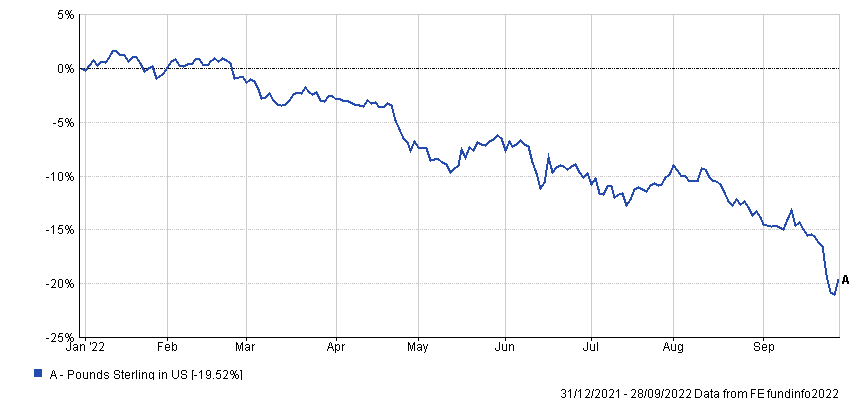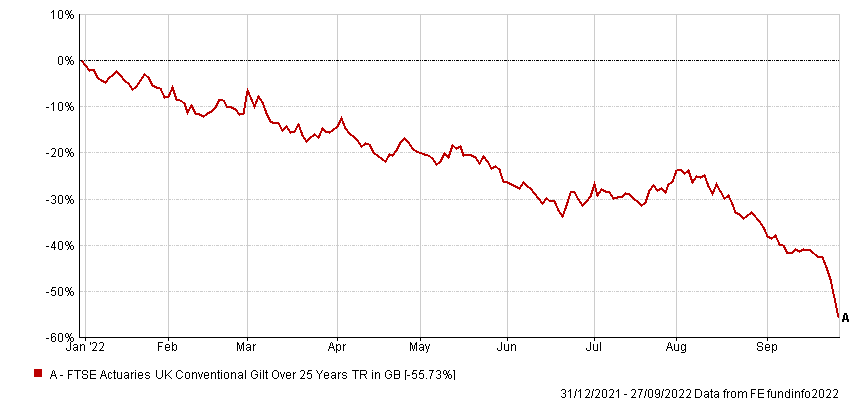It is difficult to think of any announcement made by a UK chancellor that has garnered a worse reaction from markets than Kwasi Kwarteng’s mini-Budget on Friday.
On Monday, sterling plunged to its lowest level against the dollar, with some commentators predicting the currencies could reach parity by the end of the year.
Performance of currencies in 2022

Source: FE Analytics
By Tuesday, concerns were growing that the Bank of England would need to raise interest rates from 2.25% to 6% by next year in order to prop up the pound. Homeowners who regarded themselves as reasonably affluent as recently as last week began to worry about how they would keep up with mortgage payments when their current deals expired.
Then on Wednesday, the Bank of England – which last Thursday said it would begin a quantitative tightening programme – was forced to embark on a new £65bn quantitative easing programme to prop up gilts.
So why exactly has the market rection to the chancellor’s mini-budget been so bad?
Benjamin Jones, director of macro research in Invesco’s multi-asset team, said the first problem is that by aggressively cutting taxes, Kwarteng is pulling fiscal policy in a different direction to monetary policy.
“The aim of Liz Truss’s government is clearly to stimulate growth,” he explained. “The Bank of England wants to dampen inflation by slowing growth, keeping a lid on inflation expectations. UK gilts and the pound are being caught painfully in the middle.”
The next issue is that Kwarteng’s tax cuts are unfunded – the government’s spending plans will require borrowing to hit £218bn this year, and £229bn the next.
“To fund those plans, the UK will need to issue more debt than ever before,” Jones added. “The reaction in gilt markets indicates that investors are sceptical that can be achieved.”
The “reaction” saw yields – which are inversely correlated with prices – on 30-year gilts climb above 5%, which caused a liquidity crisis in defined benefit pensions. These schemes value their liabilities in reference to gilt yields and so should benefit when these rise.
Performance of index in 2022

Source: FE Analytics
As an example, a pension scheme knows that a specific member will retire in one year on a pension of £10,500. If gilt yields are 5%, the scheme will need to allocate £10,000 to cover this liability. But if gilt yields are 10%, it will only require £9,545.5.
However, most of these funds use derivatives to hedge their positions via liability-driven investment (LDI) funds. The losses in these derivatives meant additional collateral was needed to cover these calls, forcing a widespread sell-off in assets – including gilts – causing liquidity to dry up. This is what prompted the emergency intervention from the Bank of England
Jones said that for countries such as Japan and the US, deficit spending to stimulate growth is not necessarily a problem – in Japan’s case, because it is a net asset creditor and runs a current account surplus; in the US, because of the dollar’s status as the world’s reserve currency.
He said the UK does not have that luxury, as it relies on external financing. The Budget and current account deficit currently stands at more than £250bn for this fiscal year.
“Finding investors to finance that when volatility is risking growth is not going to be easy,” Jones added.
“Against the dollar, sterling fell nearly 4% on Friday and hit a record low on Monday morning. It is clear in the short term that moves in the pound are all about confidence and have little to do with relative rate differentials.
“Though most traditional valuation measures suggest the pound is cheap, the weak growth backdrop, collapsing terms of trade, and unconventional and uncertain political backdrop mean that momentum in the pound is firmly negative.”
There is some good news, however. While the government’s large fiscal loosening and the Bank of England’s intervention are inflationary, negative base-effects remain powerful, while oil prices have fallen by about 10% in the last month and are trading lower on growth fears.
Numerous commentators have claimed we could be close to “peak capitulation” when the market bottoms out, which is the best time to buy.
And Jones noted that while the FTSE has sold off heavily since last week, the poor economic outlook for the UK doesn’t necessarily make it a bad place to invest.
“It cannot be stressed strongly enough that the UK equity market is not the UK economy, nor often a good reflection of it,” the director added. “The reason being that large-cap UK stocks generate around 75% of their earnings from overseas sources. By virtue of the translation effect, weakness in sterling, especially to the US dollar and the euro, tends to offer a boost to UK equity market earnings.”
In this way, the director said bad news for the UK economy and sterling can often be good news for UK equities.
“In the current environment, the value and yield that UK stocks offer makes them attractive, but given the volatile backdrop, there is likely to be much opportunity for stockpicking within the UK,” he added.






